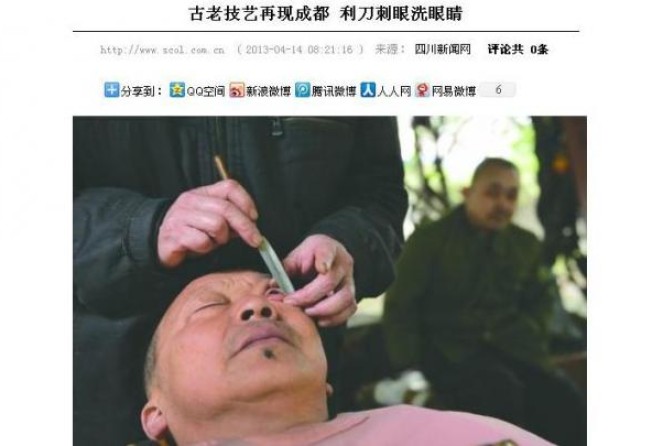Rare practice of ‘eye shaving’ still part of daily life in Chengdu

After sharpening his razor, a barber holds open one of his customer’s eyes and draws the razor across the eye lid. This might sound like a scene in the nerve-wracking Spanish surrealist movie Un Chien Andalou, but it is a daily occurrence in Chengdu.
This is a traditional Chinese practice called “eye shaving”. Sichuan barber Liu Deyuan, 53, is one of the few barbers still known to engage in the practice today, Chengdu Business Daily reported.
After dipping his razor in clean water, Liu uses one hand to hold open a customer’s eyelid while holding his razor in his other hand. He then gently scrapes the razor across the inner surface of both eye lids.
Liu then pokes a thin metal rod with a smooth ball-shaped end beneath the customer’s eye lid and moves it around like a windscreen wiper. The entire process takes about five minutes. Liu charges five yuan (HK$6.27) for eye shaving combined with a haircut and shaving facial hair.
“I am still a little bit nervous during eye shaving. I do not dare to move even a bit during the process,” said a customer who has undergone the process several times. But he also said the experience was quite comfortable, “My eyes feel moist and my vision is clearer.”
Also undeterred by the practice was a 97-year-old frequent customer surnamed Jiang, who has had Liu shave his eyelids for seven years. Jiang said he often felt his eyes were dry and something was stuck inside, but the discomfort went after eye shaving. “I can see things more clearly,” Jiang told the newspaper.
Liu said he began to learn eye shaving when he was 17 years old, and it took him three years to become proficient. Liu told the newspaper he had not caused any accidents over the course of his career.
While Liu’s customers may enjoy the service, medical specialists warn the public to be cautious. The practice was widely used in hospitals 60 or 70 years ago to treat trachoma, said Qu Chao, deputy director of the opthalmology department in the Sichuan Provincial People’s Hospital, but it has been phased out as trachoma became much less widespread and medical technology advanced.
Eye shaving can scrape away the ulcers and scar tissue under trachoma patients' eyelids, and stimulate the eyes so they would secrete a liquid to moisten the eye sockets, Qu said, but the practice could easily result in damage to people’s retinas. Poor hygiene could also result in the spread of infection of eye diseases among customers, he warned.